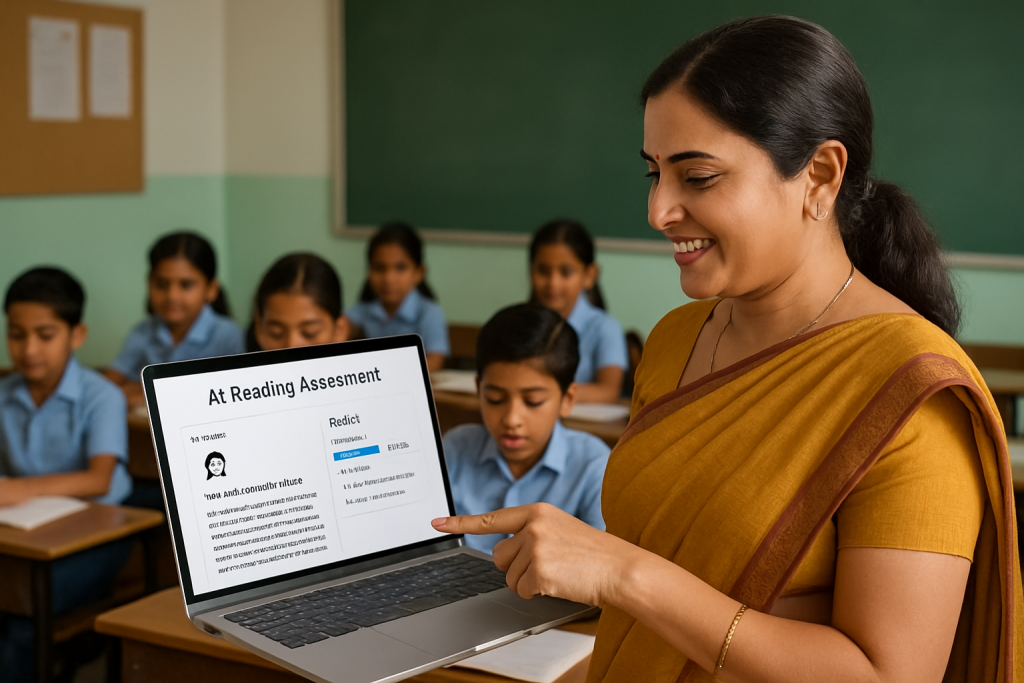Education Minister Launches TARA Reading Assessment Tool
Education Minister Dharmendra Pradhan launched TARA, IIT Bombay’s reading assessment tool. The AI-powered app now evaluates reading skills for over 7 lakh students across 1,200 schools nationwide, marking a significant step in Indian education. This marks India’s largest reading fluency assessment exercise ever.
Why TARA Matters Now
TARA addresses a critical gap in Indian education. The app uses artificial intelligence to measure reading speed, accuracy, and expression. Teachers get real-time data on student performance. This helps identify learning gaps quickly and create targeted interventions.
The Kendriya Vidyalaya Sangathan has adopted TARA for students in Grades 3-8. The app supports both English and Hindi assessments, reflecting the significance of literacy technology in educational settings. This wide deployment gives educators unprecedented insights into reading development across diverse student populations.
How TARA Solves a Key Problem
Professor Preeti Rao from IIT Bombay’s Department of Electrical Engineering led the project. TARA uses speech processing and machine learning to generate precise assessments. The app analyzes audio recordings of children reading passages aloud.
The tool measures Words Correct Per Minute and evaluates expression through phrasing, intonation, and stress. This comprehensive approach gives teachers detailed feedback on each student’s reading development. Previously, such detailed assessments required significant manual effort from educators.
Dr. Shailaja Menon from Tata Trusts highlighted the long-standing need for digital tools providing real-time learning data. TARA fills this gap by enabling audio recording, offering individual performance metrics, and generating detailed reports for entire classes, schools, or regions through a dashboard.
Strategic Advantage for EdTech Companies
The TARA launch signals growing government support for AI education tools. EdTech startups can learn from this successful public-private partnership model. IIT Bombay received funding from the Tata Centre of Technology and Design and the Abdul Kalam Technology Innovation Fellowship.
This creates opportunities for educational technology companies to develop similar solutions. The government’s commitment to digital education tools opens new market segments. Companies that build AI-powered assessment tools for other subjects could find ready adoption.
What Business Leaders Should Know
TARA’s success demonstrates the viability of AI applications in education. The app’s reliability has been validated against human expert assessments. This validation process provides a template for other AI educational tools.
The initiative shows how academic institutions can partner with government bodies for large-scale deployments. Business leaders in EdTech should note the importance of expert validation and gradual scaling in educational AI applications.
Market Impact in India
The launch represents a shift toward integrated educational technologies. As more institutions adopt tools like TARA, literacy rates across the country could improve significantly. This creates a foundation for more advanced educational AI applications.
The success of TARA may encourage similar initiatives in other educational areas. Mathematics, science, and language learning tools could follow similar development and deployment patterns. This expansion would create substantial opportunities for technology companies focused on education.
The Minister emphasized technology’s role in fostering a more literate society. He expressed optimism that TARA will empower teachers and students alike. The tool makes reading assessment more engaging for young learners while providing actionable data for educators.
This initiative sets the stage for continued innovation in educational practices. Indian educational institutions will witness tangible benefits from AI-powered assessment tools. The goal remains clear: equipping every child with foundational reading skills through technology-enhanced learning.


